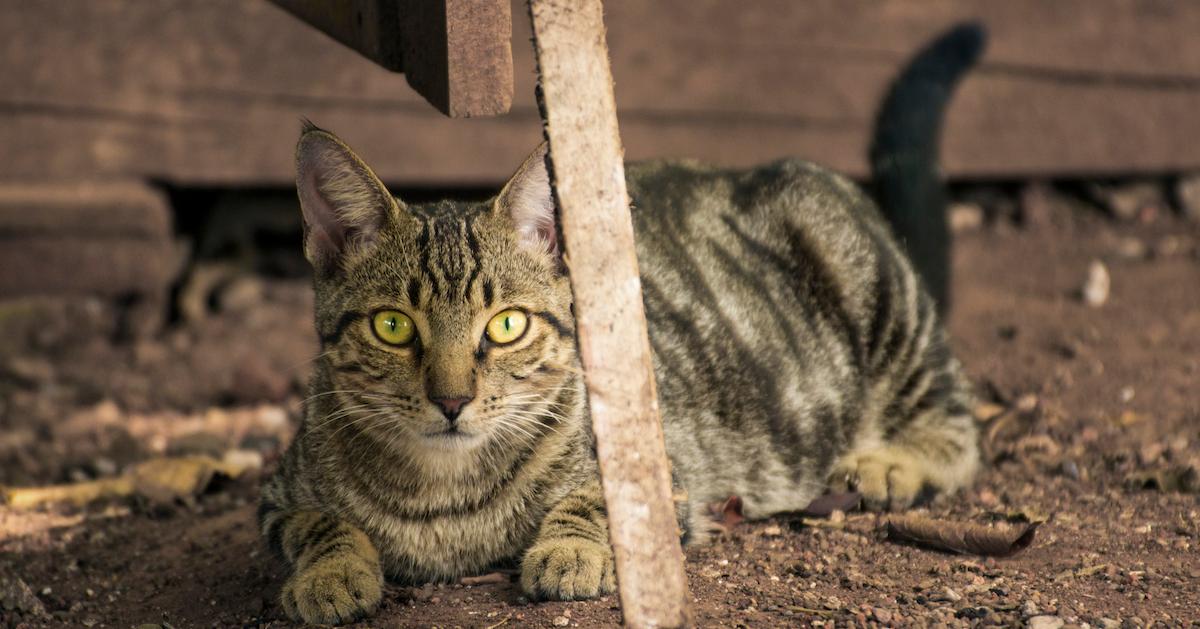Humane Methods for Keeping Stray Cats Off Your Lawn
Published June 24 2021, 5:05 p.m. ET

Even if you’re an ardent cat lover, there’s no denying that stray cats hanging around your property can become a bit of a problem over time. These feral felines wreak havoc on outdoor spaces by marking territory, scaring off birds and other beneficial critters, and potentially ruining your lawn or garden. Finding humane ways to keep cats out of your lawn and yard isn’t always easy, especially when our first instinct is to call animal control — but the following humane methods should do in a pinch.

Why keep cats out of the garden at all?
When feral cats make themselves at home in your yard, they do so by doing their business in your grass, on your patio furniture, or in garden beds. This wouldn’t be much of a problem in the case of other animal interlopers, except that solid cat waste can carry harmful intestinal parasites and diseases, and certainly don’t want that fertilizing your veggies.
According to the David Suzuki Foundation, cat feces contain parasites and pathogens that aren’t really present in herbivore manure, like the kind usually used in gardening. One of these harmful pathogens causes a disease called toxoplasmosis, which can affect your immune system, result in weeks of pain and fever, and create dangerous complications if you’re pregnant. Diseases like these are the same reason we don’t use dog poop as fertilizer.
As if that weren’t enough reason to stop stray cats micturating upon your lawn and pooping in your garden, cats are also the bane of songbirds. Sure, a stray or domestic cat in your yard might cut down on the number of mice or rats in your area, but they will also deter any would-be warblers from visiting.
Spray cat repellent
Cats have an acute sense of smell. They can detect odors with 40 times more sensitivity than we can, which means that they are that much more sensitive to odors that we won’t even bat an eye at. As a result, there are a number of different indoor and outdoor cat repellent sprays on the market. According to Bob Vila, these highly concentrated scent and flavor combinations usually need to be diluted before you go spraying them around your yard, but alternatives do exist.
For instance, you can make a simple DIY cat deterrent spray at home by combining essential oils, black pepper, cinnamon, garlic, and water. Once applied, this all-natural spray will be smelly enough to keep cats away from your lawn, garden, patio furniture, fence posts, and anywhere else you might want to dissuade them from going.

Pernicious plants
Cats’ acute sense of smell isn’t just disrupted by the presence of smelly perfumes and sprays — it can also be thrown off by certain flowering plants. According to the David Suzuki Foundation, cats have an intense distaste for the scent of rue, lavender, and pennyroyal flowers. In addition, they tend to steer clear of any yard that has Coleus canina, citronella, lemongrass, or lemon thyme growing. Planting even a few of these around the property and perimeter should keep the cats at bay.
Offensive odors
As it turns out, a handful of other random household odors are also abhorrent to cats. Citrus peels from lemons or oranges, brewed or spent coffee grounds, and even human hair can be enough to dissuade even the most curious cats. The best part is that all of these items are things you’d normally throw away anyway, so why not get some extra use out of them.
Loud sounds
If you’ve ever seen a cat startle and flee at a random noise, then you know that loud noises are pretty good motivation to get them moving. According to Neighborhood Cats, there are many motion-activated ultrasonic devices which are designed to repel cats. We’re not talking about a loud alarm system that will irritate the neighbors or wake everyone up at 3 a.m., either.
These ultrasonic devices emit sounds of such high frequency, that they are imperceptible to anything but cats… and dogs, most likely. As a result, this prevention method might not be best for those with dogs — especially dogs who are prone to barking wildly when something disturbs them.

Savage sprinklers
It’s a widely-known fact that most cats hate water, which means that those cats will absolutely despise it when water appears to spray them out of nowhere in the middle of a midnight hunt. Motion-activated sprinkler systems are a foolproof way of keeping cats off one’s lawn.
According to Neighborhood Cats, many of these sprinklers have sensors that can detect motion within a 30-foot radius. Some can go as wide as 40 feet. Careful with calibrations though — you’ll want to program the infrared sensors so that they only spray when they detect something the size of a cat.